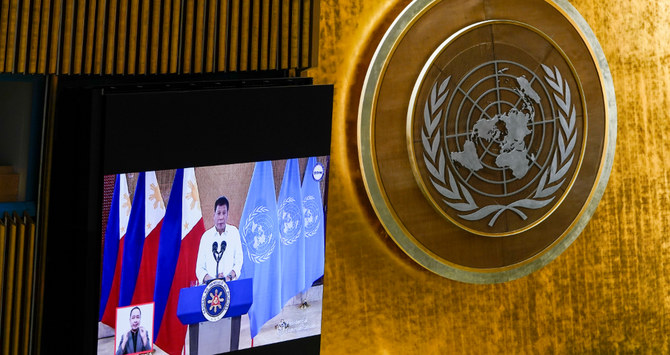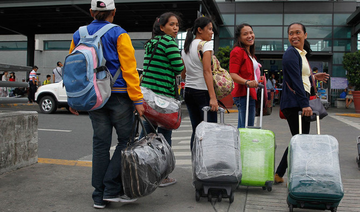MANILA: Philippines President Rodrigo Duterte has renewed his call for the abolition of the kafala or sponsorship system in Gulf countries, saying it was “unjust” and permits the “exploitation” of millions of overseas Filipino workers (OFWs).
In his speech at the 76th UN General Assembly on Wednesday, Duterte, who has advocated against the kafala system at the UN for much of his career, maintained that “nothing can justify its continued existence.”
The kafala gives employers in GCC countries plus Jordan and Lebanon almost complete control over migrant workers’ employment and immigration status and generally binds them to one employer.
In 2009, Bahrain became the first GCC country to abolish the kafala system, followed by Saudi Arabia earlier this year.
“Millions of Filipinos work abroad under the most difficult and inhumane circumstances. We call for the abolition of all structures that allow the exploitation and oppression of migrant workers,” Duterte said.
“The kafala system is one such behemoth that chains the weak, the desperate, and the voiceless to an existence of unimaginable suffering. While reforms have been made, the kafala system must be dismantled — sooner rather than later — in the name of justice and basic decency,” he added.
Under the controversial system, migrant workers must have a sponsor in the host country for a visa or worker’s permit to be issued.
Duterte has previously said that the system led to “inhumane working conditions, nonpayment of wages, movement restrictions, healthcare denial, and sexual abuse of overseas Filipino workers.”
In March, the Philippines welcomed the Kingdom’s move to end the notorious sponsorship system and replace it with new measures to ensure migrant workers in the private sector have improved job mobility and can switch jobs or leave Saudi Arabia without their employers’ consent.
The labor reforms will also allow OFWs to apply directly for government services, with all employment contracts documented online.
Dexter Garcia, a former OFW who spent a decade working as an office staff member with the Saudi Turf Company, returned to the Philippines in November last year, a few months before the Kingdom’s new laws became effective on March 14.
He said while he had “heard many stories of abuse, that was all in the past.”
“Before I left the Kingdom after my contract with my company ended last year, things were already starting to change. The Saudi government was already starting to relax the kafala,” he told Arab News.
According to the Department of Foreign Affairs, as of January 2020, there are an estimated 2,221,448 Filipinos in the Middle East.














